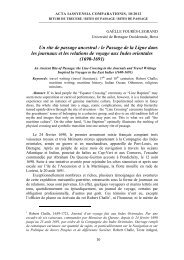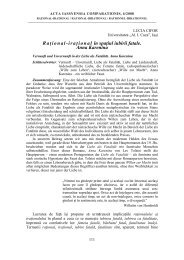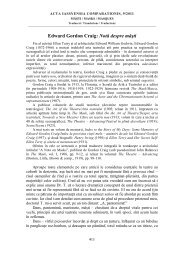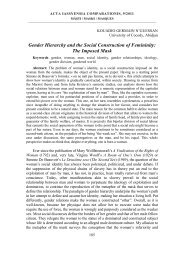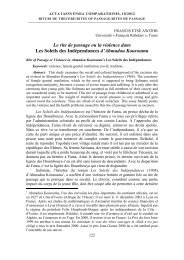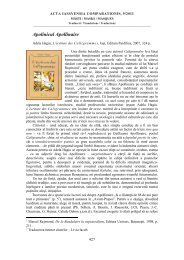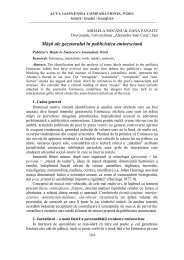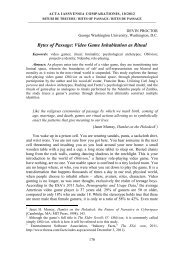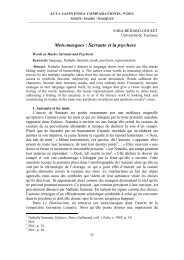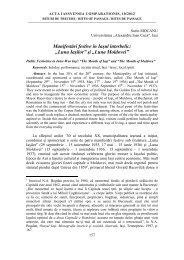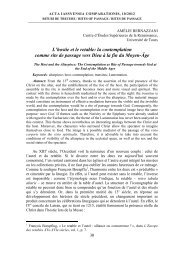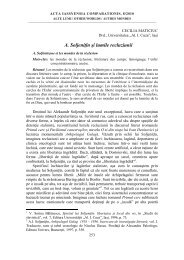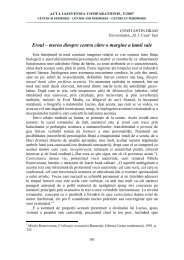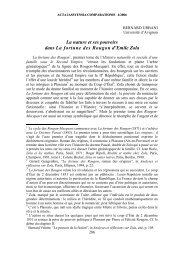Foreign Home and Familiar Abroad in Salman Rushdie's The ...
Foreign Home and Familiar Abroad in Salman Rushdie's The ...
Foreign Home and Familiar Abroad in Salman Rushdie's The ...
Create successful ePaper yourself
Turn your PDF publications into a flip-book with our unique Google optimized e-Paper software.
ACTA IASSYENSIA COMPARATIONIS, 8/2010<br />
ALTE LUMI / OTHER WORLDS / AUTRES MONDES<br />
________________________________________________________________________________<br />
280<br />
ECATERINA PĂTRAȘCU<br />
Universitatea „Spiru Haret”, București<br />
<strong>Foreign</strong> <strong>Home</strong> <strong>and</strong> <strong>Familiar</strong> <strong>Abroad</strong><br />
<strong>in</strong> <strong>Salman</strong> Rushdie’s T h e Satanic Verses<br />
“Hogar” foráneo y extranjería familiar en Los versos satánicos de <strong>Salman</strong> Rushdie<br />
Plabras clave: humanismo, <strong>in</strong>migrante, identidad, Índia, postcolonialismo, realidad<br />
Resumen: Salad<strong>in</strong> Chamcha, el personaje pr<strong>in</strong>cipal de la novela de <strong>Salman</strong> Rushdie,<br />
Los vérsos satánicos, podría ser considerado un ejempló típico del ‘viajero’ entre mundos<br />
dist<strong>in</strong>tos, del <strong>in</strong>migrante para el cual, el proceso de adopción por el nuevo país implica, de<br />
modo necesario, el rechazo s<strong>in</strong> derecho de apelación del país de origen. No obstante, la<br />
asimilación de los nuevos valores s<strong>in</strong> una previa comprensión y apropiación de los mismos,<br />
conlleva <strong>in</strong>evitablemente al conflicto drámatico entre el personaje y la realidad del mundo<br />
que había idealizado, así como al rechazo del personaje como mero ‘extranjero’. Cu<strong>and</strong>o<br />
Salad<strong>in</strong> Chamcha se da cuenta de que la identidad se construye a base de unos valores<br />
asumidos como personales y adquiridos tras un proceso <strong>in</strong>dividual y no a través de una<br />
sencilla imitación, su regreso a Indía, su país natal, deja de ser un proceso frustrado o un<br />
rechazo orgánico, para convertirse en un auténtico proceso de reevaluación <strong>in</strong>tegradora.<br />
Introduction<br />
One of the ma<strong>in</strong> characters <strong>in</strong> <strong>Salman</strong> Rushdie’s <strong>The</strong> Satanic Verses, namely<br />
Salad<strong>in</strong> Chamcha, is likely to be identified as the prototype of the hoverer between<br />
worlds <strong>in</strong> his quest of feel<strong>in</strong>g at home both with himself <strong>and</strong> as a context for an<br />
authentic liv<strong>in</strong>g. Leav<strong>in</strong>g India out of a prejudiced perspective upon it <strong>and</strong> equally<br />
bl<strong>in</strong>dly embrac<strong>in</strong>g foreignness as his home, Salad<strong>in</strong> builds a whole new identity,<br />
British, of course, forc<strong>in</strong>g his acceptance <strong>in</strong> a space he unquestionably idealizes.<br />
This artificial becom<strong>in</strong>g process runs parallel with an entire theory of hatred to his<br />
k<strong>in</strong>dred <strong>and</strong> his Indian tradition, as a modality of enforcement regard<strong>in</strong>g his<br />
English transformation. <strong>Home</strong> becomes foreign while everyth<strong>in</strong>g abroad is<br />
familiar, accord<strong>in</strong>g to a sound migration necessity. Faced with real Engl<strong>and</strong>, the<br />
constructed image of the adopted / adoptive country crack<strong>in</strong>g, Salad<strong>in</strong> returns to<br />
India which, once understood <strong>and</strong> assumed <strong>in</strong> terms of its genu<strong>in</strong>e reality <strong>and</strong><br />
values, eventually becomes his ‘home.’<br />
1. Voices of the “dream - Vilayet” – Rule, Britannia!<br />
1.1. From Salahudd<strong>in</strong> Chamchawala to Salad<strong>in</strong> Chamcha: O, pounds, o,<br />
sensibility!<br />
<strong>The</strong> image of London <strong>in</strong> <strong>The</strong> Satanic Verses varies between fanatic adoration<br />
<strong>and</strong> bitter blasphemy, emotions that orig<strong>in</strong>ate either <strong>in</strong> the prejudices of the<br />
participants to the discourse of the ‘polis’, or <strong>in</strong> the revelations related to its reality.<br />
Salahudd<strong>in</strong> Chamchawala’s first contact with Engl<strong>and</strong> is by means of a wallet<br />
full of pounds that he f<strong>in</strong>ds <strong>in</strong> the street close to Sc<strong>and</strong>al Po<strong>in</strong>t, his home: “pounds!<br />
Pounds sterl<strong>in</strong>g, from Proper London <strong>in</strong> the fabled country of Vilayet across the
ACTA IASSYENSIA COMPARATIONIS, 8/2010<br />
ALTE LUMI / OTHER WORLDS / AUTRES MONDES<br />
________________________________________________________________________________<br />
black water <strong>and</strong> far away.” 1 (35). Not very much later, genu<strong>in</strong>e London for the<br />
thirteen – year – old Salahudd<strong>in</strong> translates as archetypal London, the city of the<br />
common attraction po<strong>in</strong>ts for any visitor or immigrant – “Proper London itself,<br />
Bigben Nelsonscolumn Lordstavern Bloodytower Queen. (…) Sa<strong>in</strong>tspauls,<br />
Pudd<strong>in</strong>glane, Threadneedlestreet.” (38-39) – plus some ‘moral values’: “the dream<br />
– Vilayet of poise <strong>and</strong> moderation.” (37)<br />
Salahudd<strong>in</strong>’s first trip to London, “the brave new world”, is associated with the<br />
“<strong>in</strong>terplanetary migrations”, similar to those <strong>in</strong> Asimov’s Foundation or Bradbury’<br />
Martian Chronicles. Once <strong>in</strong> Engl<strong>and</strong> where he will benefit a proper education,<br />
Salahudd<strong>in</strong> has to deny his Indian identity <strong>and</strong> the first step <strong>in</strong> achiev<strong>in</strong>g this is the<br />
symbolic rejection of his father <strong>and</strong> of all the values he symbolizes; he declares his<br />
secularity, “liv<strong>in</strong>g without a god of any type”, as the necessary premise for<br />
becom<strong>in</strong>g “a good <strong>and</strong> proper English man.” (43) Becom<strong>in</strong>g an Englishman from<br />
this perspective means endur<strong>in</strong>g all the negative English realities he has been<br />
warned about by his Indian family – “even if there was only paper <strong>in</strong> the toilets <strong>and</strong><br />
trepid, used water full of mud <strong>and</strong> soap to step <strong>in</strong>to after tak<strong>in</strong>g exercise, even if it<br />
meant a lifetime spent amongst w<strong>in</strong>ter-naked trees” (43) or “even if his classmates<br />
giggled at his voice <strong>and</strong> excluded him from their secrets” (43) – while the best way<br />
of cop<strong>in</strong>g with this is imitat<strong>in</strong>g the ones he admires – “<strong>and</strong> that was when he began<br />
to act, to f<strong>in</strong>d masks that these fellows would recognize, pale face masks, clownmasks,<br />
until he fooled them <strong>in</strong>to th<strong>in</strong>k<strong>in</strong>g he was okay, he was people-like-us.” (43)<br />
Salahudd<strong>in</strong>’s unconditioned surrender to idealized Engl<strong>and</strong> proves successful<br />
due to his adopt<strong>in</strong>g <strong>and</strong> adapt<strong>in</strong>g policy: five years later, Salahudd<strong>in</strong> becomes<br />
Salad<strong>in</strong>, “after the fashion of the English school” (45), while, by graduation time,<br />
he has already received his British passport, wish<strong>in</strong>g to cont<strong>in</strong>ue his English<br />
experience as an actor. Salad<strong>in</strong>’s career choice goes h<strong>and</strong> <strong>in</strong> h<strong>and</strong> with his identity<br />
choice: be<strong>in</strong>g an actor needs all the ‘pathos’, ‘hedonism’ <strong>and</strong> ‘disguise’ present <strong>in</strong> a<br />
migrant as well, Salad<strong>in</strong> assum<strong>in</strong>g the ‘Creator’s role’ <strong>in</strong> both directions: “A man<br />
who sets out to make himself up is tak<strong>in</strong>g on the Creator’s role, accord<strong>in</strong>g to one<br />
way of see<strong>in</strong>g th<strong>in</strong>gs; he’s unnatural, a blasphemer, an abom<strong>in</strong>ation of<br />
abom<strong>in</strong>ations. From another angle, you could see pathos <strong>in</strong> him, hedonism <strong>in</strong> his<br />
struggle (…). Or, consider him socio-politically: most migrants learn, <strong>and</strong> can<br />
become disguises. Our own false descriptions to counter the falsehoods <strong>in</strong>vented<br />
about us, conceal<strong>in</strong>g for reasons of security our secret selves.” (49) Salad<strong>in</strong>’s<br />
project of becom<strong>in</strong>g <strong>in</strong> accordance with the English st<strong>and</strong>ards <strong>in</strong>cludes lead<strong>in</strong>g a<br />
proper personal life too: he marries Pamela Lovelace, English, part of his “happy<br />
future”: “He tried to <strong>in</strong>vent a happy future for them, to make it come true by<br />
mak<strong>in</strong>g it up <strong>and</strong> then believ<strong>in</strong>g <strong>in</strong> it.” (51)<br />
Salad<strong>in</strong> Chamcha constructs his English identity start<strong>in</strong>g from mimick<strong>in</strong>g the<br />
typical English facial expression to adopt<strong>in</strong>g the English perspective upon the<br />
world. “This face was h<strong>and</strong>some <strong>in</strong> a somewhat sour, patrician fashion, with long,<br />
thick, downturned lips like those of a disgusted turbot, <strong>and</strong> th<strong>in</strong> eyebrows arch<strong>in</strong>g<br />
sharply over eyes that watched the world with a k<strong>in</strong>d of alert contempt.” (33)<br />
1 All quotes are from <strong>Salman</strong> Rushdie, <strong>The</strong> Satanic Verses, London: V<strong>in</strong>tage Books, 2006 (1988)<br />
281
ACTA IASSYENSIA COMPARATIONIS, 8/2010<br />
ALTE LUMI / OTHER WORLDS / AUTRES MONDES<br />
________________________________________________________________________________<br />
With<strong>in</strong> the same adapt<strong>in</strong>g process, learn<strong>in</strong>g the modulations of the foreign voice<br />
enriches his new identity.<br />
Return<strong>in</strong>g to India, faced with a reality that tries to impose on him, Salad<strong>in</strong><br />
rejects it as ‘not his home.’ His home, Engl<strong>and</strong>, ‘tangible, material’, is the space <strong>in</strong><br />
which he has “success, money, wife.” (61) For the actor of the thous<strong>and</strong> voices,<br />
London represents “the real world” he returns to after India’s first attempt to<br />
recuperate him: “He was a neat man <strong>in</strong> a buttoned suit head<strong>in</strong>g for London <strong>and</strong> an<br />
ordered, contended life. He was a member of the real world.” (74) “Ellowen<br />
Deeowen” (London) circumscribes the values that Salad<strong>in</strong> believes <strong>in</strong> as hav<strong>in</strong>g<br />
been adopted as his own: “I am a man to whom certa<strong>in</strong> th<strong>in</strong>gs are of importance:<br />
rigour, self-discipl<strong>in</strong>e, reason, the pursuit of what is noble without recourse to that<br />
old crutch – God. <strong>The</strong> ideal of beauty, the possibility of exaltation, the m<strong>in</strong>d.” (135)<br />
Engl<strong>and</strong> is the “moderate <strong>and</strong> common-sensical l<strong>and</strong>” (158) whose “first class”<br />
(164) Citizen he was, also “a member of Actors’ Equity, the Automobile<br />
Association <strong>and</strong> the Garrick Club.” (163)<br />
Even after the explosion of the return plane <strong>and</strong> his transformation <strong>in</strong>to a<br />
monstrous devil goat, Salad<strong>in</strong> cont<strong>in</strong>ues to deny his Indian self – “‘I’m not your k<strong>in</strong>d’<br />
(…) ‘you’re not my people. I have spent half my life try<strong>in</strong>g to get away from you” (he<br />
tells Sufyan, Indian owner of the Sha<strong>and</strong>aar Café) – <strong>and</strong> to re<strong>in</strong>force the rightfulness<br />
of his English transformation: “Had he not pursued his own idea of the good, sought<br />
to become that which he most admired, dedicated himself with a will border<strong>in</strong>g on<br />
obsession to the conquest of Englishness? Had he not worked hard, avoided trouble,<br />
striven to become new? Assiduity, fastidiousness, moderation, restra<strong>in</strong>t, self-reliance,<br />
probity, family, life: what did these add up to if not a moral code?” (256-257)<br />
Assum<strong>in</strong>g the label Civis Britannicus sum, Salad<strong>in</strong> Chamcha makes the apology<br />
of London as an “islet of sensibility, surrounded by the cool sense of the sea” (398),<br />
tell<strong>in</strong>g his/its love story. His <strong>in</strong>itial attitude was one of prostration, followed by the<br />
desire of identification with it, annihilat<strong>in</strong>g his previous existence. London means<br />
hospitality – “We Londoners can be proud of our hospitality” (398) - , hav<strong>in</strong>g a long<br />
tradition of an authentic refuge for those attracted by its splendor – London cannot be<br />
identified with “the new regulations that controlled immigration” or with the<br />
catastrophic experience while he was a monster. “Of material th<strong>in</strong>gs, he had given his<br />
love to this city, London, preferr<strong>in</strong>g it to the city of his birth or to any other, had been<br />
creep<strong>in</strong>g up to it, stealthily, with mount<strong>in</strong>g excitement, freez<strong>in</strong>g <strong>in</strong>to a statue when it<br />
looked <strong>in</strong> his direction, dream<strong>in</strong>g of be<strong>in</strong>g the one to possess it <strong>and</strong> so, <strong>in</strong> a sense,<br />
become it.” (398) For Salad<strong>in</strong>, London is “O Proper London!”, the past <strong>and</strong> the<br />
present which he adopts <strong>and</strong> which is believed to circumscribe his future; imag<strong>in</strong>ed<br />
London is the equivalent of “culture, city, wife; <strong>and</strong> a fourth <strong>and</strong> f<strong>in</strong>al love, of which<br />
he had spoken to nobody: the love of a dream [hav<strong>in</strong>g a baby]” (400).<br />
1.2. What is daddy say<strong>in</strong>g? – “A freak, an actor!”<br />
Five years after Salahudd<strong>in</strong>’s transformation <strong>in</strong>to Salad<strong>in</strong> of the Vilayeti, for<br />
Changez Chamcawala, the father, Engl<strong>and</strong> means his son’s show<strong>in</strong>g “contempt for<br />
his own k<strong>in</strong>d” (45) as well as his son’s transformation <strong>in</strong>to “a fauntleroy, a gr<strong>and</strong><br />
282
ACTA IASSYENSIA COMPARATIONIS, 8/2010<br />
ALTE LUMI / OTHER WORLDS / AUTRES MONDES<br />
________________________________________________________________________________<br />
panj<strong>and</strong>rum, (…) a freak.” (45) Once hear<strong>in</strong>g of Salad<strong>in</strong>’s carrier choice, that of<br />
be<strong>in</strong>g an actor, Changez translates it accord<strong>in</strong>g to Indian st<strong>and</strong>ards: “a confounded<br />
gigolo”, “a ghoul, a hoosh (…). An actor!” (48), label<strong>in</strong>g it as devil’s work, betrayal<br />
of his family’s values <strong>and</strong> of his country’s heritage. What for Salad<strong>in</strong> means a<br />
modality of conquer<strong>in</strong>g the hearts of the people he wants to belong to, a quick way of<br />
be<strong>in</strong>g one of “people-like-us” by mimick<strong>in</strong>g them unconditionally, for Changez his<br />
son’s job means “spend[<strong>in</strong>g] your life jiggl<strong>in</strong>g <strong>and</strong> preen<strong>in</strong>g under bright lights,<br />
kiss<strong>in</strong>g blonde women under the gaze of strangers who have paid to watch your<br />
shame.” (47) Salad<strong>in</strong>’s English transformation equals with the <strong>in</strong>terruption of the<br />
Indian family l<strong>in</strong>e <strong>and</strong> tradition, the annihilation of Changez’s posterity: “He has<br />
made himself <strong>in</strong>to an imitator of non-exist<strong>in</strong>g men. I have nobody to follow me, to<br />
give what I have made. This is his revenge: he steals from me my posterity.” (71)<br />
1.3. Pamela Chamcha, née Lovelace – (bloody) Britannia: warm beer, m<strong>in</strong>ce<br />
pies <strong>and</strong> common sense<br />
If, for Salad<strong>in</strong> Chamcha, the projected <strong>and</strong> idealized image of Engl<strong>and</strong> is also<br />
the only reality he accepts as plausible <strong>and</strong> possible, his wife, Pamela,<br />
discrim<strong>in</strong>ates between fantasy, Salad<strong>in</strong>’s one, <strong>and</strong> what Engl<strong>and</strong> really st<strong>and</strong>s for.<br />
Talk<strong>in</strong>g to Jumpy Joshy, her husb<strong>and</strong>’s former colleague <strong>and</strong> her present lover,<br />
Pamela accuses Salad<strong>in</strong> of his touristic approach to Engl<strong>and</strong>: “Him <strong>and</strong> his Royal<br />
Family, you wouldn’t believe. Cricket, the Houses of Parliament, the Queen. <strong>The</strong><br />
place never stopped be<strong>in</strong>g a picture postcard to him. You couldn’t get him to look<br />
at what was really real.”(175) More than that, Pamela herself, despite be<strong>in</strong>g his<br />
wife, is part of the same clichéistic approach, Salad<strong>in</strong>’s perception of her be<strong>in</strong>g a<br />
typological, never a particular one: “I was bloody Britannia. Warm beer, m<strong>in</strong>ce<br />
pies, common-sense <strong>and</strong> me. But I’m really real, too, Jumpy Joshy; I really really<br />
am.”(175) Pamela compla<strong>in</strong>s about be<strong>in</strong>g perceived as noth<strong>in</strong>g more than all the<br />
other attraction po<strong>in</strong>ts, part of Salad<strong>in</strong>’s ideal world, “with the voice st<strong>in</strong>k<strong>in</strong>g of<br />
Yorkshire pudd<strong>in</strong>g <strong>and</strong> hearts of oak, that hearty, rubicund voice of ye olde dream<br />
– Engl<strong>and</strong> which he so desperately wanted to <strong>in</strong>habit.”(180) <strong>The</strong> unseen, other<br />
world of their relationship is, however, an impossible dialogue – “I could never say<br />
anyth<strong>in</strong>g to you, not really, not the least th<strong>in</strong>g” (183) –, rudeness – “You<br />
<strong>in</strong>terrupted me <strong>in</strong> public” (183) – <strong>and</strong> f<strong>in</strong>ally Pamela’s <strong>in</strong>sight unveil<strong>in</strong>g the “empty<br />
space” beh<strong>in</strong>d his acted certa<strong>in</strong>ty.<br />
In addition to accus<strong>in</strong>g Salad<strong>in</strong> of a distorted, prejudiced Engl<strong>and</strong>-view,<br />
Pamela sketches the realistic portrait of London, an image Salad<strong>in</strong> is not or does<br />
not want to be aware of: it is a London of <strong>in</strong>justice, racial prejudices, social<br />
acceptance limitations, violence to the other. Pamela, the deputy community<br />
relations officer <strong>and</strong> “damn good at it, ifisaysomyself” (183), relates: “We just<br />
elected our first black Chair <strong>and</strong> all the votes cast aga<strong>in</strong>st him were white. Down<br />
the hatch! Last week a respected Asian street trader, for whom MPs of all parties<br />
had <strong>in</strong>terceded, was deported after eighteen years <strong>in</strong> Brita<strong>in</strong> because, fifteen years<br />
ago, he posted a certa<strong>in</strong> form forty-eight hours late. Ch<strong>in</strong>-ch<strong>in</strong>! Next week <strong>in</strong><br />
Brickhall Magistrates’ Court the police will be try<strong>in</strong>g to fit up a fifty-year-old<br />
283
ACTA IASSYENSIA COMPARATIONIS, 8/2010<br />
ALTE LUMI / OTHER WORLDS / AUTRES MONDES<br />
________________________________________________________________________________<br />
Nigerian woman, accus<strong>in</strong>g her of assault, hav<strong>in</strong>g previously beaten her senseless.<br />
Skol!” (183) <strong>The</strong> real English normality differs from Salad<strong>in</strong>’s “museum – values<br />
(…) hang<strong>in</strong>g <strong>in</strong> golden frame on honorific walls” (399): Pamela refers to normality<br />
<strong>in</strong> terms of “coppers tak<strong>in</strong>g their clothes off <strong>and</strong> dr<strong>in</strong>k<strong>in</strong>g ur<strong>in</strong>e out of helmets” or<br />
“black people (…) scared out of their heads, talk<strong>in</strong>g about obeah, chicken entrails,<br />
the lot. <strong>The</strong> goddamn bastards are enjoy<strong>in</strong>g this: scare the coons with their own<br />
ooga booga <strong>and</strong> have a few naughty nights <strong>in</strong>to the barga<strong>in</strong>.” (280) Though “weird”<br />
or “unlikely”, this is the face of Engl<strong>and</strong> that Salad<strong>in</strong> must “wake up” to <strong>and</strong> with<br />
which Pamela is realistically faced on a regular basis.<br />
1.4. Zeeny Vakil – India’s call<strong>in</strong>g<br />
Zeeny Vakil, Salad<strong>in</strong>’s Indian lover <strong>and</strong> <strong>in</strong>tended rescuer, assumes the<br />
objective consciousness role, reflect<strong>in</strong>g Salad<strong>in</strong> <strong>in</strong>to the mirror of an unmythicized<br />
reality. Thus Zeeny po<strong>in</strong>ts to his “Angreez accent” bluntly try<strong>in</strong>g to make him<br />
aware that “it’s [not] so perfect, it slips, baba, like a false moustache.” (52) What<br />
Salad<strong>in</strong> considers a successful English career <strong>in</strong> act<strong>in</strong>g – he is the heart of <strong>The</strong><br />
Aliens Show (together with Mimi Mamoulian), his gift for mimicry earn<strong>in</strong>g him the<br />
title of “Man of a Thous<strong>and</strong> Voices <strong>and</strong> a Voice” (60) - , a fact that builds up to his<br />
Englishness, corresponds to Zeeny’s denunciation: “<strong>The</strong>y pay you to imitate them,<br />
as long as they don’t have to look at you. Your voice becomes famous but they<br />
hide your face.” (60) Later, but not very late, the very producer of the show, Hal<br />
Valance, will unveil the truth about it <strong>and</strong> will del<strong>in</strong>eate Salad<strong>in</strong>’s real position as<br />
an actor: “Audience surveys show that ethnics don’t watch ethnic shows. (…) <strong>The</strong>y<br />
want fuck<strong>in</strong>g Dynasty, like everyone else. Your profile’s wrong. (…) you’re<br />
history.” (265)<br />
Zeeny expla<strong>in</strong>s the evidence hid<strong>in</strong>g beneath Salad<strong>in</strong>’s bl<strong>in</strong>dness as to his<br />
successful career, referr<strong>in</strong>g to the ‘wrong colour’ of his face as the reason for which<br />
only his voice is used. His ‘top’ position on the English voice scene is<br />
counterpoised, for Zeeny, by his travel to “wogl<strong>and</strong> [India] with some two-bit<br />
company, play<strong>in</strong>g the babu part (…) just to get <strong>in</strong>to a play” (61), while Salad<strong>in</strong>’s<br />
enthusiasm <strong>and</strong> complete total dedication means noth<strong>in</strong>g else than a “bloody slave<br />
mentality.” (61)<br />
1.5. Jumpy Joshy – a friend, not really<br />
Jumpy Joshy, Salad<strong>in</strong>’s friend <strong>and</strong> next-<strong>in</strong>-bed with Pamela, shares the latter’s<br />
look<strong>in</strong>g-down on Salad<strong>in</strong>, the Englishman <strong>in</strong> progress: his friend’s complex <strong>and</strong><br />
full-hearted effort of becom<strong>in</strong>g scales down to “an imitation of life, a mask’s<br />
mask.” (174) Salad<strong>in</strong>’s English world, laboriously eng<strong>in</strong>eered <strong>and</strong> passionately<br />
<strong>in</strong>habited, translates, for Joshy, <strong>in</strong>to “the caricature of an actor’s room, full of<br />
signed photographs of colleagues, h<strong>and</strong>bills, framed programmes, production stills,<br />
citations, awards, volumes of movie-star memoirs” (174) – there is no sign <strong>in</strong><br />
Jumpy’s Salad<strong>in</strong>-view of the latter’s English adopted moral values, life-style,<br />
behavior pattern, or family constellation. Engl<strong>and</strong>, <strong>in</strong> Salad<strong>in</strong>’s case, is “his<br />
Engl<strong>and</strong>, the one he believed <strong>in</strong>.” (175)<br />
284
ACTA IASSYENSIA COMPARATIONIS, 8/2010<br />
ALTE LUMI / OTHER WORLDS / AUTRES MONDES<br />
________________________________________________________________________________<br />
1.6. Salad<strong>in</strong> back to Salahudd<strong>in</strong> – the sharp kick of reality<br />
After the explosion of Bostan, the plane, on his return from India <strong>and</strong> his<br />
l<strong>and</strong><strong>in</strong>g on the British l<strong>and</strong>, Salad<strong>in</strong> turns <strong>in</strong>to a goat-resembl<strong>in</strong>g devilish creature,<br />
his m<strong>in</strong>utely composed English appearance crack<strong>in</strong>g to let go of an “Animal (…)<br />
You’re all the same. Can’t expect animals to observe civilized st<strong>and</strong>ards. (…) you<br />
little fuck” (158) Engl<strong>and</strong>, the “cool Vilayet” (37), becomes a “universe of fear”<br />
(158) whose only entities are three immigration officers <strong>and</strong> five policemen. In the<br />
police van where he is boxed up under the suspicion of be<strong>in</strong>g an illegal immigrant<br />
or at least a serious social danger, Salad<strong>in</strong> experiences his first contact with real<br />
Engl<strong>and</strong> – “he felt a sharp kick l<strong>and</strong> on his ribs, pa<strong>in</strong>ful <strong>and</strong> realistic enough” (158)<br />
– <strong>and</strong> realizes that he is perceived <strong>in</strong> the same way as the “riff-raff from villages <strong>in</strong><br />
Sylhet or the bicycle-repair shops of Gujranwala” (159) <strong>and</strong> not at all accord<strong>in</strong>g to<br />
his m<strong>in</strong>utely constructed English identity. (Look<strong>in</strong>g like Shaitan would have<br />
contradicted any English looks one way or another!)<br />
<strong>The</strong> humiliation experienced by the still gullible Salad<strong>in</strong> is later sentimentally<br />
theorized <strong>in</strong>to a self-oriented lamentation: if he obeyed <strong>and</strong> assumed all that<br />
Engl<strong>and</strong> st<strong>and</strong>s for, “then how cruel these fates were to <strong>in</strong>stigate his rejection by<br />
the very world he had so determ<strong>in</strong>edly courted; how desolat<strong>in</strong>g, to be cast from the<br />
gates of the city one believed oneself to have taken long ago! – what mean smallm<strong>in</strong>dedness<br />
was this, to cast him back <strong>in</strong>to the bosom of his people, from whom<br />
he’d felt so distant for so long!” (254)<br />
After the disaster produced at the Hot Wax nightclub, where, because of him,<br />
everyth<strong>in</strong>g was set on fire, Salad<strong>in</strong>, com<strong>in</strong>g back to his human appearance,<br />
declares: “I’ll come back to life.” (400)<br />
<strong>The</strong> real London forces him <strong>in</strong>to expla<strong>in</strong><strong>in</strong>g the abstract notions from his<br />
previous sterile discourse: “Easier said than done; it was life, after all, that had<br />
rewarded his love of a dream-child with childlessness; his love of a woman, with her<br />
estrangement from him <strong>and</strong> her <strong>in</strong>sem<strong>in</strong>ation by his old college friend; his love of a<br />
city, by hurl<strong>in</strong>g him down towards it from Himalayan heights; <strong>and</strong> his love of a<br />
civilization, by hav<strong>in</strong>g him bedeviled, humiliated, broken upon its wheel.” (401)<br />
Return<strong>in</strong>g to India s<strong>in</strong>ce hear<strong>in</strong>g about his father’s imm<strong>in</strong>ent death, - but not because<br />
of this - Salad<strong>in</strong> approaches his much despised past differently, revaloriz<strong>in</strong>g what he,<br />
as a child, bl<strong>in</strong>dly rejected as be<strong>in</strong>g necessarily bad. From this new perspective, “His<br />
old English life, its bizzarreries, its evils, now seemed very remote, even irrelevant,<br />
like his truncated stage-name.” (534) What has happened is not a reversal of roles –<br />
Engl<strong>and</strong>: bad, India: good – but Salad<strong>in</strong>’s underst<strong>and</strong><strong>in</strong>g <strong>and</strong> valu<strong>in</strong>g of the two<br />
realities <strong>and</strong>, most importantly, of his relat<strong>in</strong>g to them (Salad<strong>in</strong>’s evolution from<br />
fanaticism to humanism is the topic of a different article).<br />
2. India – between the Country of Oz <strong>and</strong> Assam<br />
2.1. Salad<strong>in</strong>’s India – from dust to muck<br />
<strong>The</strong> image of India which Salahudd<strong>in</strong> repudiates by embrac<strong>in</strong>g the image of<br />
Engl<strong>and</strong> <strong>in</strong>stead breathes the same artificiality as the latter. Abjur<strong>in</strong>g India<br />
orig<strong>in</strong>ates <strong>in</strong> a prejudice, a mental cliché, not <strong>in</strong> the least the consequence of it<br />
285
ACTA IASSYENSIA COMPARATIONIS, 8/2010<br />
ALTE LUMI / OTHER WORLDS / AUTRES MONDES<br />
________________________________________________________________________________<br />
hav<strong>in</strong>g been understood. As a matter of fact, Salahudd<strong>in</strong> cannot formulate any<br />
reproach to his native country when he leaves it, <strong>in</strong> the same way <strong>in</strong> which what he<br />
admires about London is an assembly of collected images, not the result of a lived<br />
experience. Once mesmerized by the “real pounds” st<strong>and</strong><strong>in</strong>g for the fabled Vilayet,<br />
Salahudd<strong>in</strong> starts anathematiz<strong>in</strong>g “the Bombay of dust, vulgarity, policemen <strong>in</strong><br />
shorts, transvestites, movie fanz<strong>in</strong>es, pavement sleepers <strong>and</strong> the rumoured s<strong>in</strong>g<strong>in</strong>g<br />
whores of Grant Road.” (37) <strong>The</strong> “poise <strong>and</strong> moderation” (37) Engl<strong>and</strong> is<br />
theoretically associated with balances the actual “confusion <strong>and</strong> super-abundance”<br />
of the already estranged Bombay.<br />
Five years after his immersion <strong>in</strong> the unconditionally admired Engl<strong>and</strong>, ‘critical<br />
th<strong>in</strong>k<strong>in</strong>g’ st<strong>and</strong>s as Salad<strong>in</strong>’s newest ability acquired as part of his education,<br />
apply<strong>in</strong>g it to everyth<strong>in</strong>g that spr<strong>in</strong>gs <strong>in</strong> his way dur<strong>in</strong>g the short visit back home. His<br />
Indian home is the place where “the fans are fixed too loosely (…), the food is too<br />
fatten<strong>in</strong>g (…), the top-floor balconies are unsafe (…), we are just jungle people.”<br />
(44) Salad<strong>in</strong>’s adolescent – maybe underst<strong>and</strong>able - revolt rema<strong>in</strong>s unabated as the<br />
process of build<strong>in</strong>g an English identity is <strong>in</strong> progress: his first mature visit home does<br />
not nuance any of his previous radical taunts addressed to everyth<strong>in</strong>g that is Indian,<br />
his alien country be<strong>in</strong>g noth<strong>in</strong>g else than “the old despised disorder. (…) rubble,<br />
litter, noise.” (54) Examples are picked up at a glace: while read<strong>in</strong>g a newspaper,<br />
Salad<strong>in</strong> “neutrally” transfers the <strong>in</strong>formation about a Bombay ‘rail roko’<br />
demonstration which proves Indian police as violent, corrupted <strong>and</strong> demagogic.<br />
On the plane fly<strong>in</strong>g back to Engl<strong>and</strong>, afraid that his speech has been <strong>in</strong>fested with<br />
“the Bombay lilt”, Salad<strong>in</strong> rapidly enumerates all the “diabolic [Indian] humiliations”<br />
he expects to endure: “Would he take to putt<strong>in</strong>g coconut-oil <strong>in</strong> his hair? Would he<br />
take to squeez<strong>in</strong>g his nostrils between thumb <strong>and</strong> foref<strong>in</strong>ger, blow<strong>in</strong>g noisily <strong>and</strong><br />
draw<strong>in</strong>g forth a glut<strong>in</strong>ous silver arc of muck?” (34) All <strong>in</strong> all, Salad<strong>in</strong> rounds off his<br />
journey to India as a negative experience: “regression”, “unnatural”, “denial of time”,<br />
“revolt aga<strong>in</strong>st history”, <strong>and</strong> “the whole th<strong>in</strong>g was bound to be a disaster.” (34)<br />
2.2. Indians’ India<br />
<strong>The</strong> new identity of India consists, <strong>in</strong>deed, <strong>in</strong> <strong>in</strong>authenticity, an amalgam of<br />
borrowed elements, guaranteed by the others’ outside perception, <strong>and</strong> not by the<br />
locals’ <strong>in</strong>side necessary del<strong>in</strong>eation, the loan identity surpass<strong>in</strong>g qualitatively the<br />
real one. Zeeny Vakil, the character who will fall <strong>in</strong> love with Salad<strong>in</strong> Chamcha<br />
after his separation from Pamela, his wife, is the author of <strong>The</strong> Only Good Indian, a<br />
book that perfectly illustrates India’s status: “She was an art critic whose book on<br />
the conf<strong>in</strong><strong>in</strong>g myth of authenticity, that folkloristic straitjacket which she sought to<br />
replace by an ethic of historically validated eclecticism, for was not the entire<br />
national culture based on the pr<strong>in</strong>ciple of borrow<strong>in</strong>g whatever clothes seem to fit,<br />
Aryan, Mughal, British, take-the-best-<strong>and</strong>-leave-the-rest? – had created a<br />
predictable st<strong>in</strong>k, especially because of its title.” (52)<br />
<strong>The</strong> real image of India could be built only as a result of concrete situations or<br />
based on testimonies from with<strong>in</strong> – Bhupen G<strong>and</strong>hi, a close acqua<strong>in</strong>tance of Zeeny<br />
Vakil, narrates the locals’ reaction to the passengers <strong>in</strong>volved <strong>in</strong> a railway disaster:<br />
286
ACTA IASSYENSIA COMPARATIONIS, 8/2010<br />
ALTE LUMI / OTHER WORLDS / AUTRES MONDES<br />
________________________________________________________________________________<br />
“After the accident, he said, the surviv<strong>in</strong>g passengers swam to the shore (the tra<strong>in</strong><br />
had plunged off a bridge) <strong>and</strong> were met by local villagers, who pushed them under<br />
the water until they drowned <strong>and</strong> then looted their bodies.” (55)<br />
Acknowledg<strong>in</strong>g, formulat<strong>in</strong>g <strong>and</strong> assum<strong>in</strong>g their national identity prove<br />
problematic for Rushdie’s India citizens. Only by successfully achiev<strong>in</strong>g these can<br />
India claim its status as a civilized place; it is by means of orient<strong>in</strong>g towards itself<br />
<strong>and</strong> assum<strong>in</strong>g its gestures, however cruel they might be, that India could def<strong>in</strong>e<br />
itself as different from the other nations: “ ‘We always forgive ourselves by<br />
blam<strong>in</strong>g outsiders, America, Pakistan, any damn place. Excuse me, George, but for<br />
me it all goes back to Assam, we have to start with that.’ <strong>The</strong> massacre of the<br />
<strong>in</strong>nocents. Photographs of children’s corpses, arranged neatly <strong>in</strong> l<strong>in</strong>e like soldiers<br />
on parade. <strong>The</strong>y had been clubbed to death, pelted with stones, their necks cut <strong>in</strong><br />
half by knives. Those neat ranks of death, Chamcha remembered. As if only horror<br />
could st<strong>in</strong>g India <strong>in</strong>to orderl<strong>in</strong>ess. (…) ‘We are all guilty of Assam,’ he [Bhupen]<br />
said. ‘Each person of us. Unless <strong>and</strong> until we face it, that the children’s deaths were<br />
our fault, we cannot call ourselves a civilized people.’”(56)<br />
Bombay represents a culture of duplicates, imitations, the success models from<br />
beyond borders be<strong>in</strong>g dreamt of <strong>and</strong> unmediatedly transposed locally. It is not only<br />
architecture works but also values <strong>and</strong> behaviours that are imitated: “Bombay was a<br />
culture of re-makes. Its architecture mimicked the skyscrapers, its c<strong>in</strong>ema endlessly<br />
re-<strong>in</strong>vented <strong>The</strong> Magnificent Seven <strong>and</strong> Love Story (…). Its millionaires, too, had<br />
taken to import<strong>in</strong>g their lives.” (64)<br />
<strong>The</strong> reality of Bombay is one under construction, <strong>in</strong> the process of self-def<strong>in</strong><strong>in</strong>g,<br />
a process <strong>in</strong> which Salad<strong>in</strong> is <strong>in</strong>volved as well, on a different trajectory, though. <strong>The</strong><br />
image of Bombay when he leaves it illustrates this hypostasis: “<strong>The</strong> aeroplane lifted<br />
<strong>and</strong> banked over the city. Somewhere below him, his father was dress<strong>in</strong>g up a servant<br />
as his dead wife. <strong>The</strong> new traffic scheme had jammed the city centre solid. Politicians<br />
were try<strong>in</strong>g to build careers by go<strong>in</strong>g on padyatras, pilgrimages on foot across the<br />
country. <strong>The</strong>re were graffiti that read: Advice to politicos. Only step to take: padyatra<br />
to hell. Or, sometimes: to Assam. Actors were gett<strong>in</strong>g mixed up <strong>in</strong> politics. (…)<br />
Salad<strong>in</strong> Chamcha, on Flight 420, closed his eyes; <strong>and</strong> felt, with deep relief, the telltale<br />
shift<strong>in</strong>gs <strong>and</strong> settl<strong>in</strong>gs <strong>in</strong> his throat which <strong>in</strong>dicated that his voice had begun of its<br />
own accord to revert to its reliable, English self.” (73)<br />
<strong>The</strong> hypostases of India depicted <strong>in</strong> <strong>The</strong> Satanic Verses vary from the ignorant<br />
perception to the demagogy of “<strong>in</strong>volvement”. Between the two poles the reader<br />
discovers a fragmented reality <strong>in</strong> which the lack of structur<strong>in</strong>g leads to the violence<br />
of the lack of mean<strong>in</strong>g, <strong>in</strong> which masks are mistaken for identities while unveil<strong>in</strong>g<br />
truths could trigger crimes.<br />
2.3. Old Salahudd<strong>in</strong>’s India, “solid <strong>and</strong> real”<br />
Zeeny Vakil used to accuse Salad<strong>in</strong> of ignorance to the real Bombay of the<br />
present <strong>and</strong> of the past, of <strong>in</strong>difference to the space he once rejected without hav<strong>in</strong>g<br />
experienced its genu<strong>in</strong>e image: “What do you know about Bombay? Your own city,<br />
only it never was. To you, it’s a dream of childhood. Grow<strong>in</strong>g up on Sc<strong>and</strong>al Po<strong>in</strong>t is<br />
287
ACTA IASSYENSIA COMPARATIONIS, 8/2010<br />
ALTE LUMI / OTHER WORLDS / AUTRES MONDES<br />
________________________________________________________________________________<br />
like liv<strong>in</strong>g on the moon. No bustees there, no sirrees, only servants’ quarters. Did<br />
Shiv Sena elements come there to make communal trouble? Were your neighbours<br />
starv<strong>in</strong>g <strong>in</strong> the textile strike? Did Datta Samant stage a rally <strong>in</strong> front of your<br />
bungalows? How old were you when you met a trade unionist? How old the first<br />
time you got on a local tra<strong>in</strong> <strong>in</strong>stead of a car with driver? That wasn’t Bombay,<br />
darl<strong>in</strong>g, excuse me. That was Wonderl<strong>and</strong>, Peristan, Never-Never, Oz.” (55)<br />
After Salad<strong>in</strong>’s last return to India, the before despised reality proves<br />
unchanged: India is the country that can be def<strong>in</strong>ed as the place of sexual<br />
discrim<strong>in</strong>ation <strong>and</strong> humiliation, crimes <strong>in</strong>volv<strong>in</strong>g armament sc<strong>and</strong>als, religious<br />
atrocities, political corruption, social useless revolts. How does Salad<strong>in</strong> – turned –<br />
Salahudd<strong>in</strong> react? He senses it as a “world (…) solid <strong>and</strong> real” (534) that he is open<br />
to underst<strong>and</strong><strong>in</strong>g <strong>and</strong> <strong>in</strong> which he wants to be <strong>in</strong>volved: “Me, tak<strong>in</strong>g part <strong>in</strong> a<br />
CP(M) event. Wonders will never cease.” (538)<br />
Zeeny Vakil, f<strong>in</strong>ally satisfied with Salad<strong>in</strong>’s act<strong>in</strong>g career / act<strong>in</strong>g life end,<br />
exposes Indian liv<strong>in</strong>g <strong>and</strong> underst<strong>and</strong><strong>in</strong>g rules: “If you’re serious about shak<strong>in</strong>g off<br />
your foreignness, Salad baba, then don’t fall <strong>in</strong>to some k<strong>in</strong>d of rootless limbo<br />
<strong>in</strong>stead. Okay? We’re all here. We’re right <strong>in</strong> front of you. You should really try<br />
<strong>and</strong> make an adult acqua<strong>in</strong>tance with this place, this time. Try <strong>and</strong> embrace this<br />
city, as it is, not some childhood memory that makes you both nostalgic <strong>and</strong> sick.<br />
Draw it close. <strong>The</strong> actually exist<strong>in</strong>g place. Make its faults your own. Become its<br />
creature; belong.” (541)<br />
Conclusion<br />
<strong>The</strong> image of Engl<strong>and</strong> that Salad<strong>in</strong> Chamcha worships from the very beg<strong>in</strong>n<strong>in</strong>g<br />
of his identity quest is one entirely based on ‘sell<strong>in</strong>g’ preconceptions – from the<br />
fasc<strong>in</strong>ation with the attraction po<strong>in</strong>ts <strong>in</strong> London, cont<strong>in</strong>u<strong>in</strong>g with behavioural<br />
patterns, to an entire moral system. Be<strong>in</strong>g a proper Englishman means, for Salad<strong>in</strong>,<br />
mimick<strong>in</strong>g <strong>in</strong>discrim<strong>in</strong>at<strong>in</strong>gly what he idealizes, <strong>in</strong> spite of the other voices<br />
(Pamela Chamcha, Zeeny Vakil, Changez Chamchawala) try<strong>in</strong>g to make him aware<br />
of the hidden but real facet of the “cool Vilayet.” It equally <strong>in</strong>volves repudiat<strong>in</strong>g<br />
India, as a necessarily – to – be – blamed <strong>in</strong>ferno, despite Salad<strong>in</strong>’s superficiality <strong>in</strong><br />
its approach <strong>and</strong> underst<strong>and</strong><strong>in</strong>g.<br />
Pa<strong>in</strong>fully experienc<strong>in</strong>g the harsh reality of his imag<strong>in</strong>ed Engl<strong>and</strong>, Salad<strong>in</strong><br />
becomes conscious of the fragility <strong>and</strong> irreality of all values <strong>and</strong> assets he used to<br />
believe <strong>in</strong> <strong>and</strong> praise. English gods turn fake <strong>and</strong> vanish while Salad<strong>in</strong> is<br />
“miraculously” born back home. If “miraculously” to be expla<strong>in</strong>ed necessitates an<br />
entirely new discussion (<strong>and</strong> a new article), Salad<strong>in</strong>’s return home as “home” is the<br />
reality at the end of his waken<strong>in</strong>g –up journey. <strong>The</strong> India that Salad<strong>in</strong> f<strong>in</strong>ds now is<br />
not different from the one he left beh<strong>in</strong>d. What differs is his approach to it, no<br />
longer prejudiced <strong>and</strong> wrongly – <strong>in</strong>tentioned, but a sympathiz<strong>in</strong>g <strong>and</strong> embrac<strong>in</strong>g<br />
one.<br />
288



